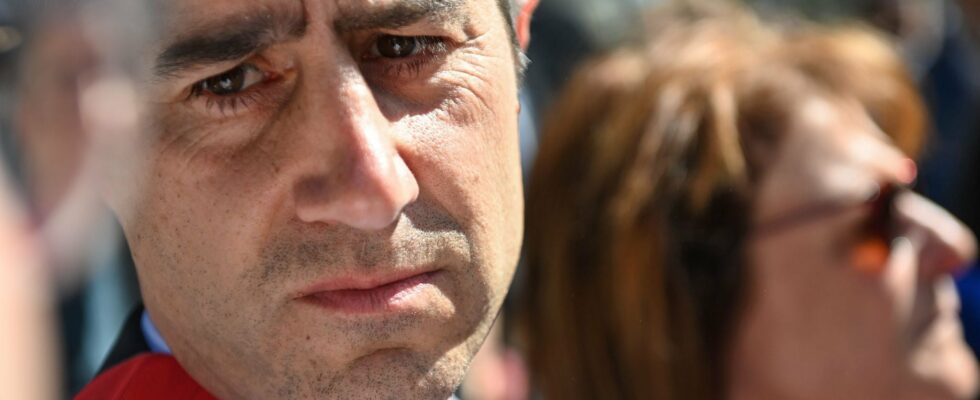“Beaten, not defeated,” declared Fabien Roussel, the national secretary of the Communist Party, on the evening of his defeat in the 20th constituency of the North. And yet, in office for seven years, the communist leaves a seat occupied for half a century by the party of Maurice Thorez, Georges Marchais and his ilk to the National Rally, which was leading in this constituency.
This scenario has occurred in many other places in France which are in the process of tipping over during these early legislative elections where a navy blue wave is sweeping away everything (or almost everything) in its path.
Ruffin is stunned but not knocked out.
If the sentence is final for Fabien Roussel, other unshakeable figures must be content with an uncomfortable reprieve. In Picardy, the LFI dissident François Ruffin is stunned but not K.-O. “It’s about playing the match. We’re going to make up the four points in the coming week,” assures the leader of Picardie Debout, who came in second place (33.92%) behind the National Rally (40.69%). For the second round, he can only count on a transfer of votes following the withdrawal of Albane Branlant (22.68%), the majority candidate.
Much further south, the electoral situation is identical for his friend Christophe Bex, invested by the New Popular Front in the 7th constituency of Haute-Garonne. Here again, the rebel, candidate for re-election, comes in second place (33.17%) behind the National Rally (40.37%). On the left for almost 40 years, the constituency threatens to fall into the arms of Le Pen. Faced with the danger, the Macronist candidate withdraws. Élisabeth Toutut-Picard, who came in third place (24.81%), asks her voters to “think carefully about the model of society they want […] and to favor the choice most likely to protect republican and European values.”
The left to save Private Marleix?
For his part, Olivier Marleix is lagging behind by thirteen points in the 2nd constituency of Eure-et-Loir. The president of the Republicans group in the National Assembly only obtained 25.93% of the votes. Olivier Dubois, the RN candidate, meanwhile won 38% of the votes, threatening to steal a seat from the Gaullist right wing since 1988. The only hope for Olivier Marleix? The votes of the left. 153 votes behind the right wing candidate, Nadia Faveris nevertheless chose to withdraw. The socialist candidate aligned herself with the national directives.
Olivier Marleix is not the only political opponent to have benefited from the withdrawal of the left. The former Prime Minister, whose image is undeniably associated with pension reform and the multiplication of 49.3, hopes to benefit from the withdrawal of the NFP candidate in her constituency of Orne. Coming in second (28.93%), Elisabeth Borne must make up a little more than 8 points to hope to overtake the RN candidate, Nicolas Calbrix.
The situation of government executives is delicate
In Landes, Geneviève Darrieussecq, former Minister Delegate for Disabled People, hopes to save her constituency from the hands of the RN. Wrestled from the left in 2017 by this MoDem member, the territory could fall into the hands of Véronique Fossey. With 37.23% of the vote, the RN candidate beats the former minister of the Philippe, Castex and Borne governments by nine points. Here too, the majority hopes to pay for the withdrawal of the NFP candidate, who came in third.
The situation of government officials is delicate. The results of the first round have forced five ministers of Gabriel Attal to withdraw: Sabrina Agresti-Roubache (Secretary of State for the City), Patricia Mirallès (Secretary of State for Veterans and Remembrance), Dominique Faure (Minister Delegate for Local Authorities), Fadila Khattabi (Minister Delegate for the Elderly) and Marie Guévenoux (Minister Delegate for Overseas Territories). For their part, Stanislas Guérini and Agnès Pannier-Runacher managed to qualify. But the former is ten points behind. He will not be able to count on the withdrawal since he is behind Léa Balage El Mariky, the NFP’s environmental candidate. The latter must make up a deficit of almost 16 points on the RN. In her 2nd constituency of Pas-de-Calais, she will still be able to count on the withdrawal of the NFP candidate.
However, while withdrawal appears to be the most effective tool for left and center blocs, it is above all a bet on the ability of voters to follow a voting instruction. In other situations, such as quadrangular elections, it may prove ineffective.
The 8th constituency of the Rhône, which saw four candidates qualify for the second round, risks falling into the hands of the RN after forty years spent under the colours of the Gaullist right. Coming in fourth place (20.66%), Nathalie Serre – the outgoing Republican MP – chose to remain behind the RN (33.46%), the NFP (22.75%) and the majority (21.18%). But the latter chose to withdraw. Probably in vain.
